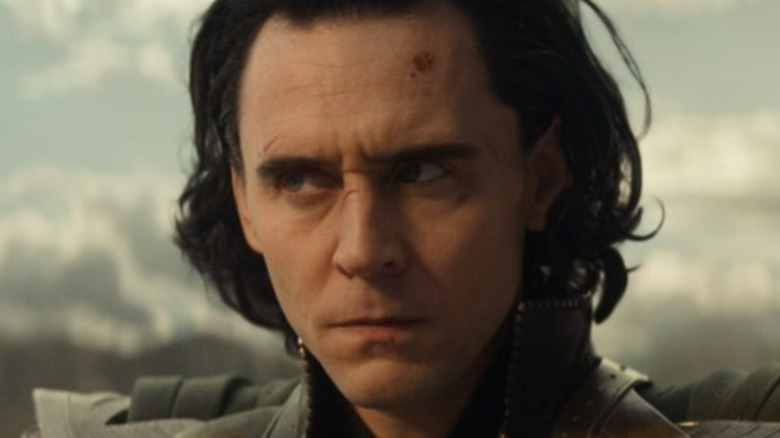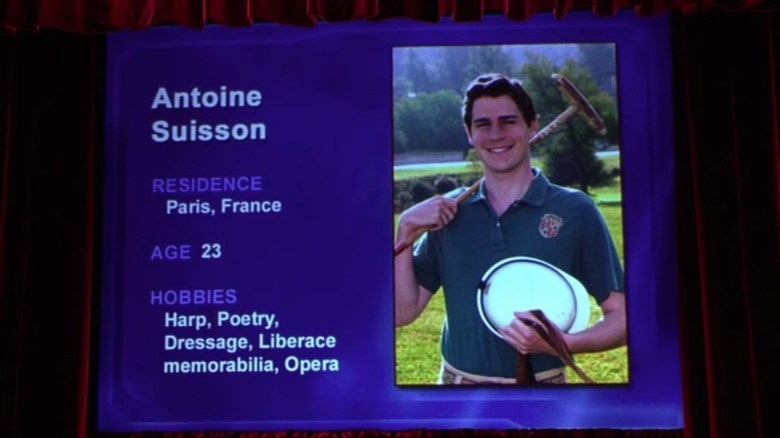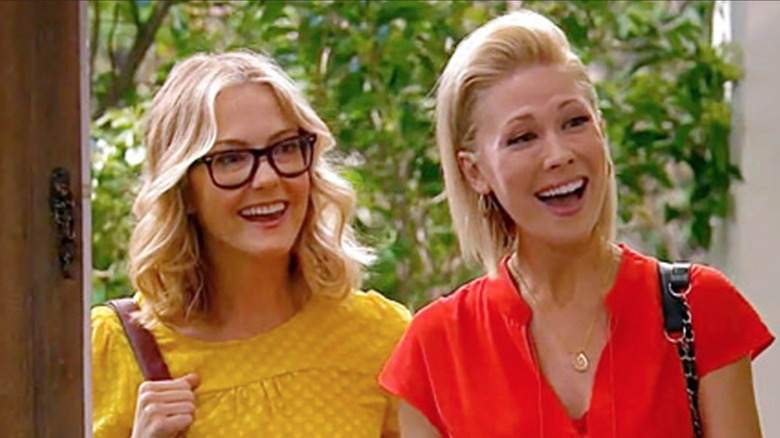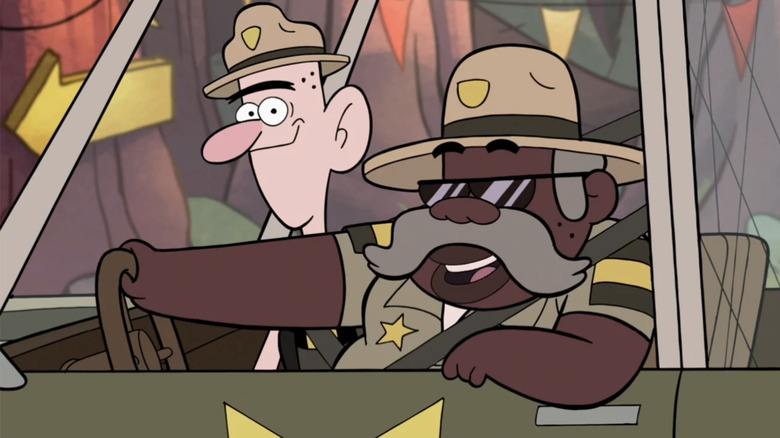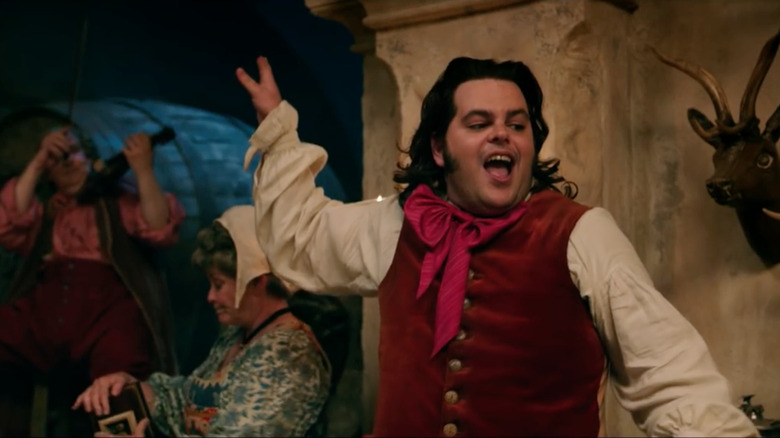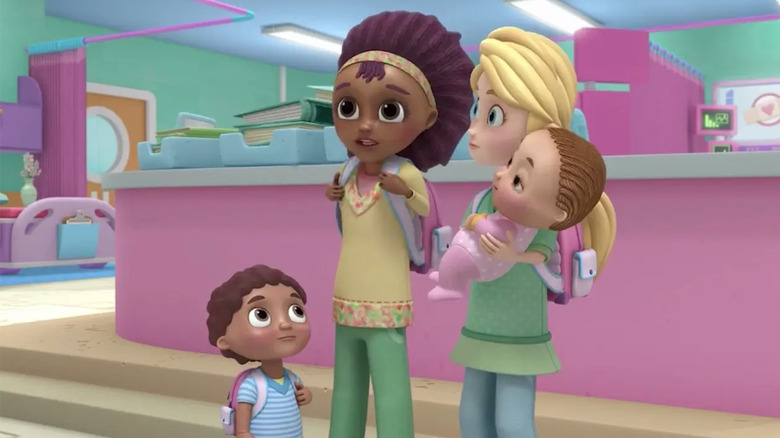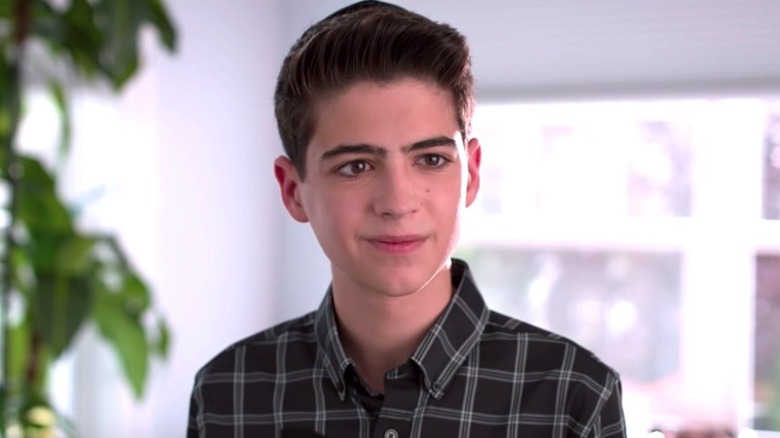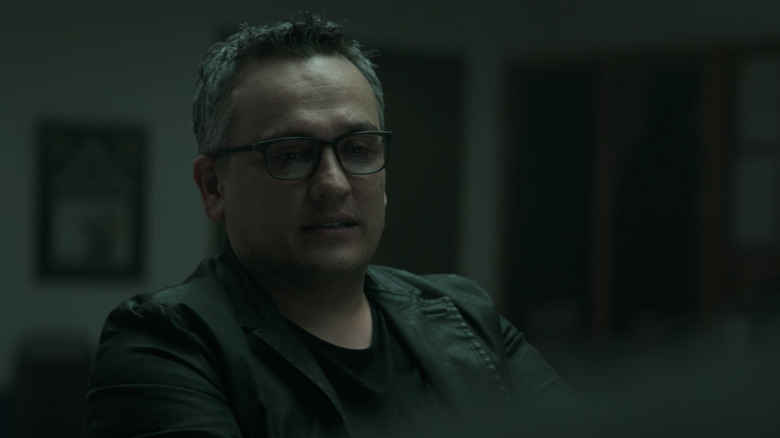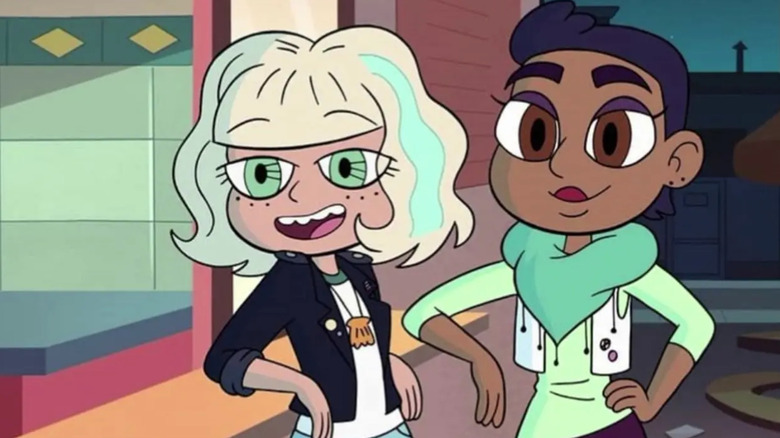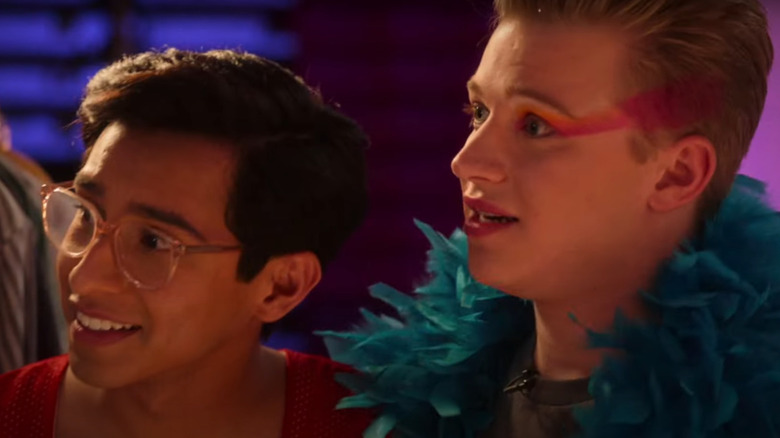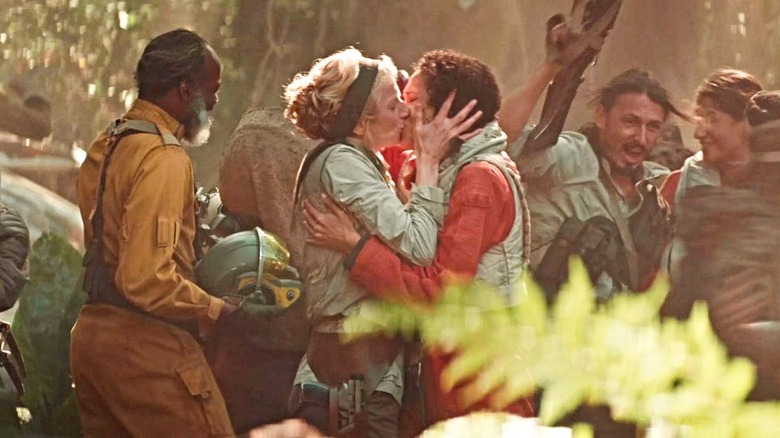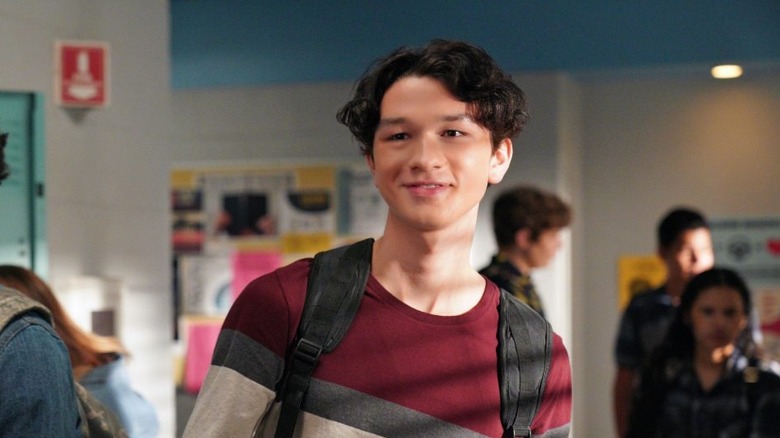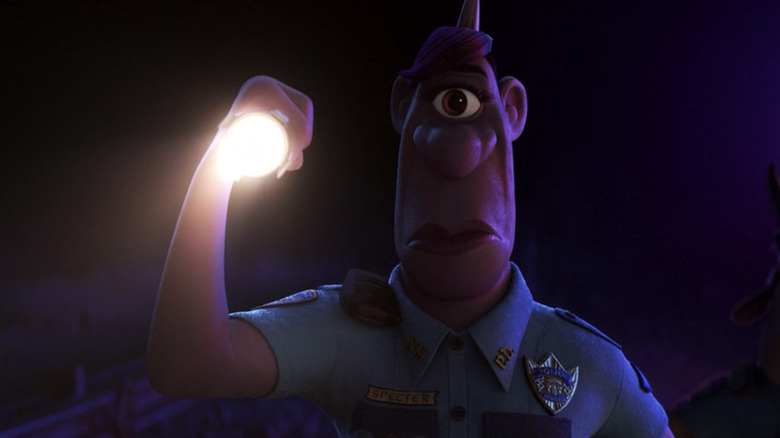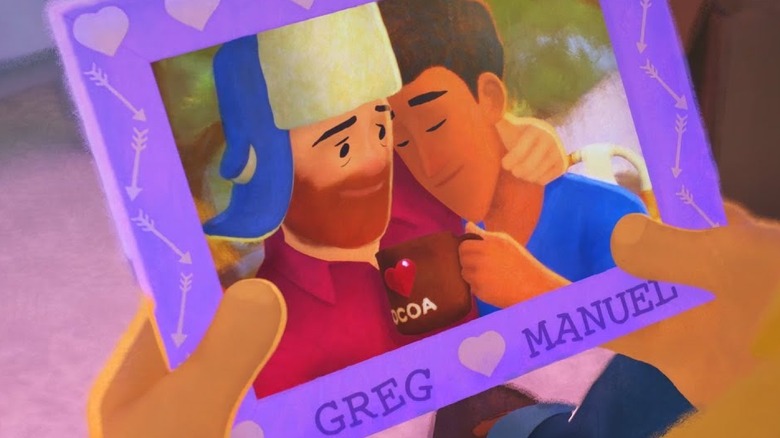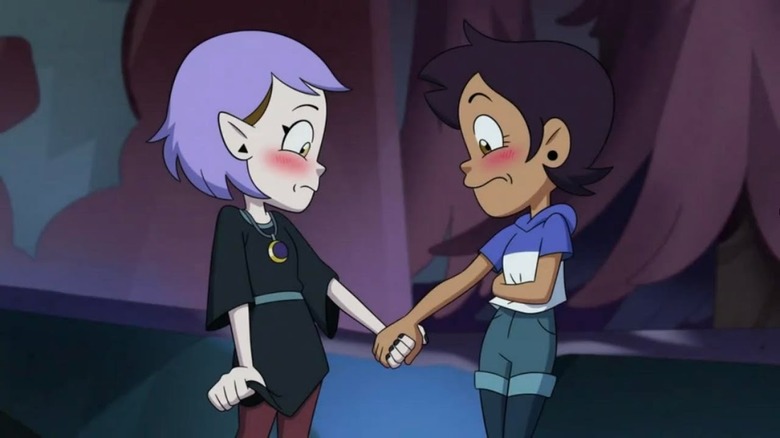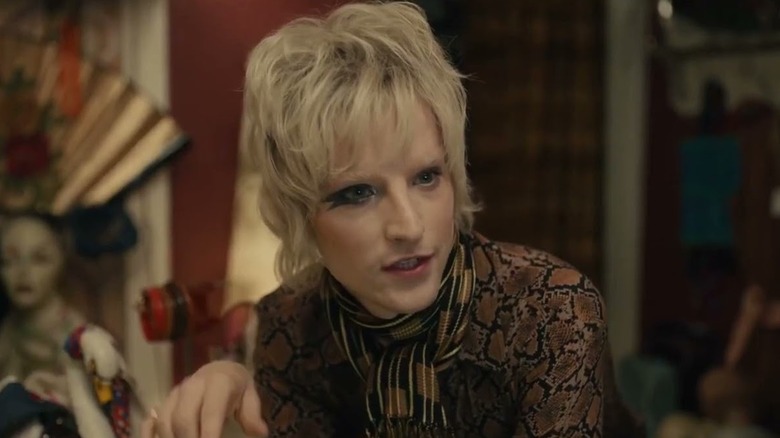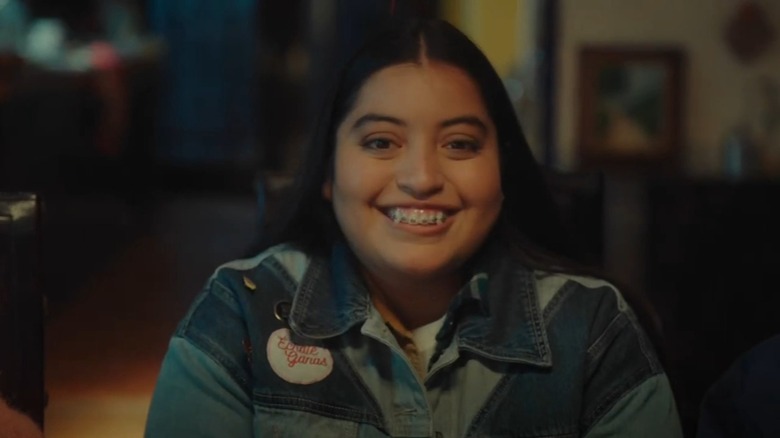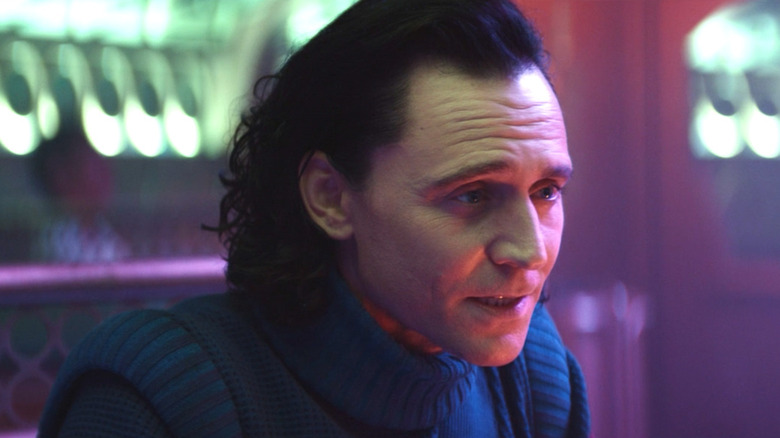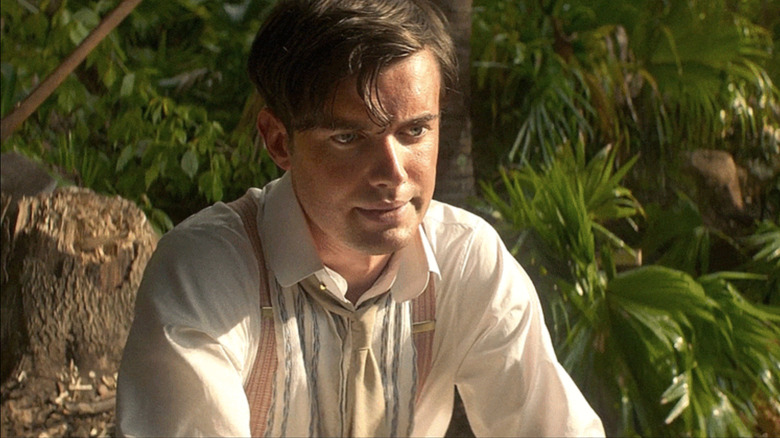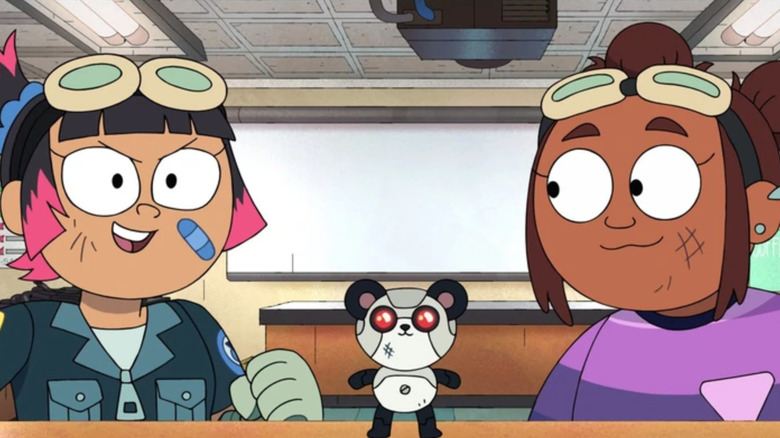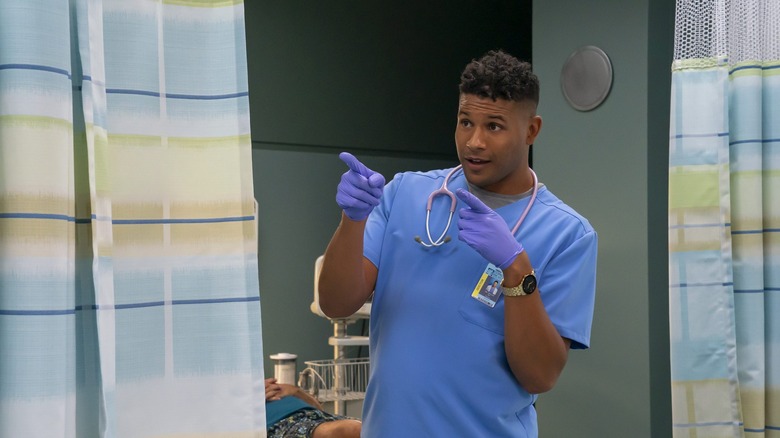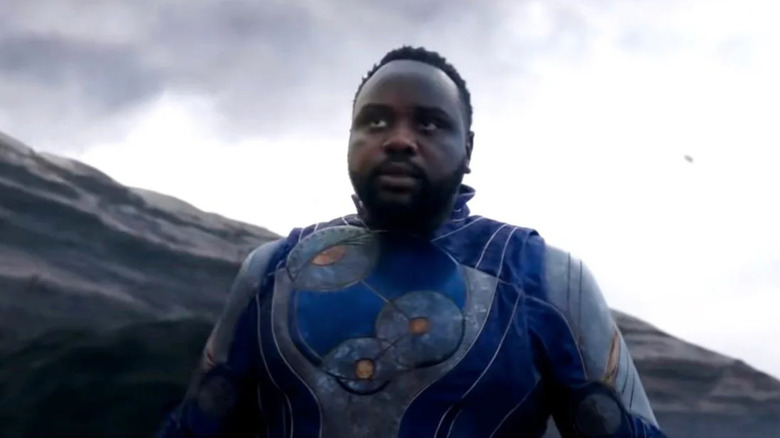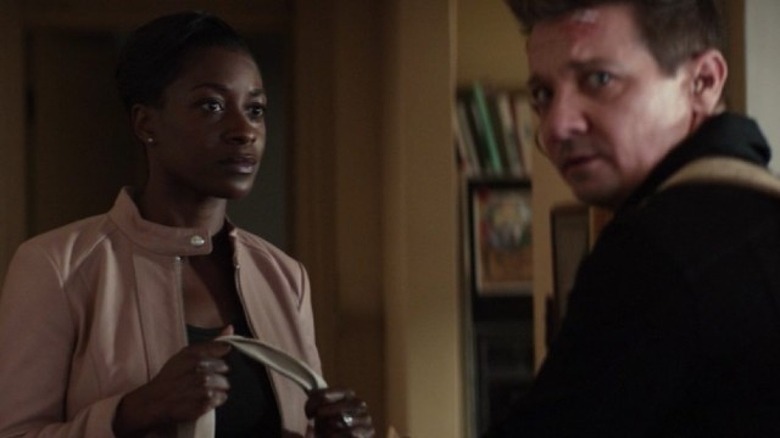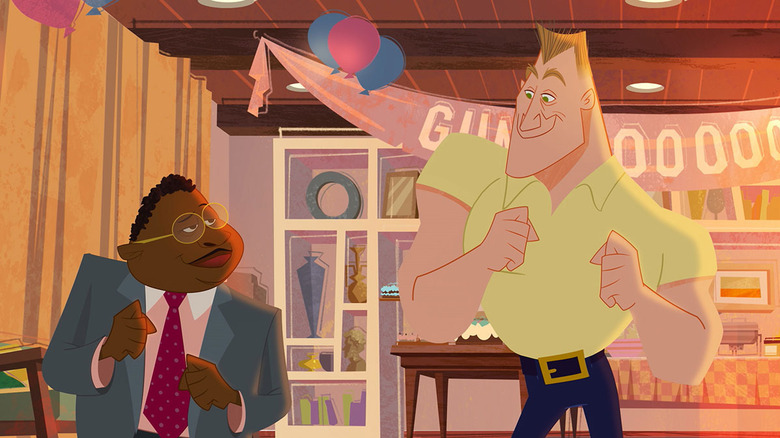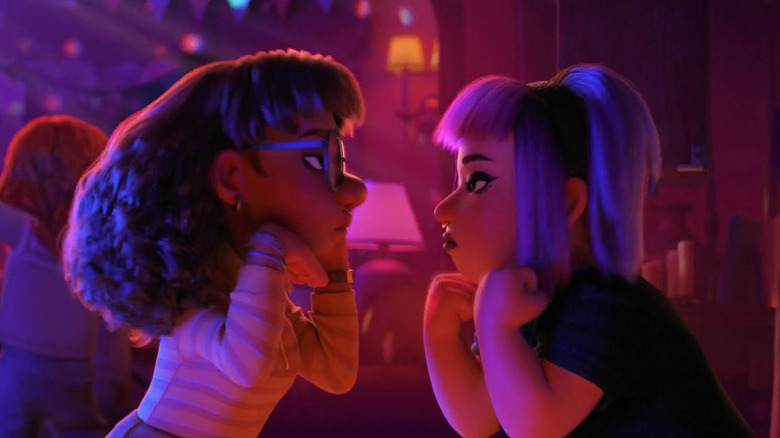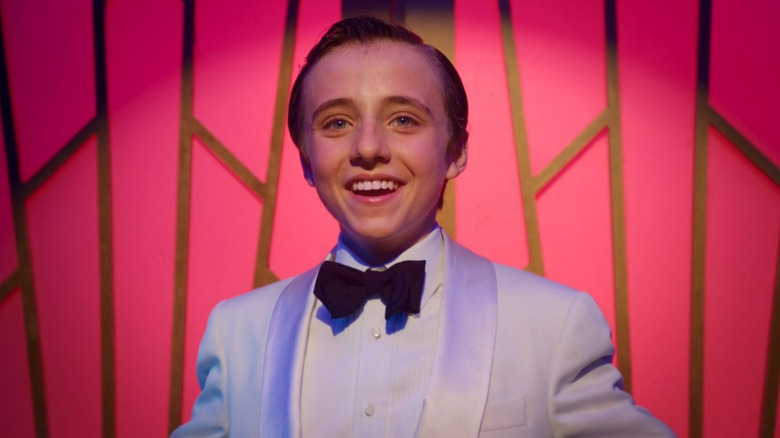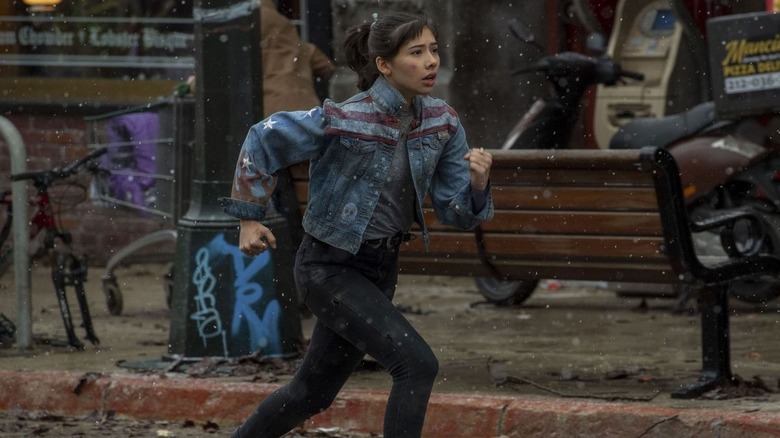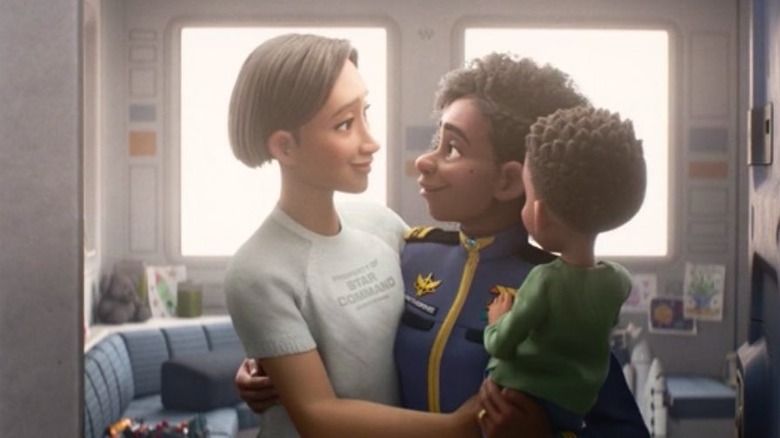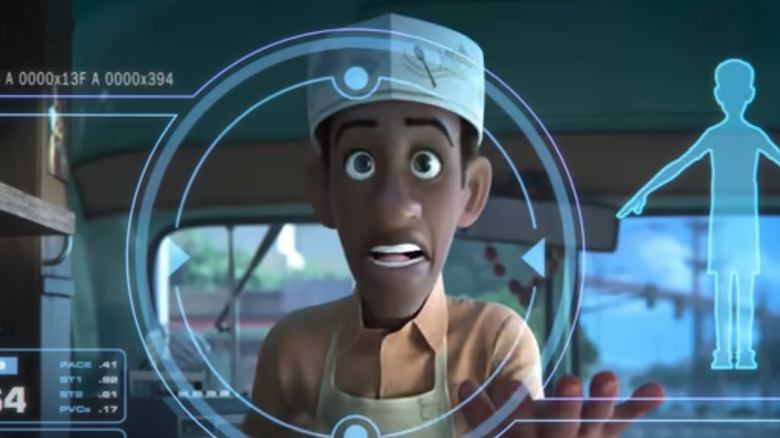Every Disney LGBTQ Character Explained
The issue of LGBTQ+ representation in Disney movies has become the source of much controversy. LGBTQ+ advocates have often criticized the lack of representation in the company's releases, often finding what is there to be minimal or tokenistic. Creatives working for Disney have complained about LGBTQ+ content being censored. On the other side of things, increasingly vocal homophobic and transphobic hate movements have attacked Disney for including any LGBTQ+ representation at all (per CNN). To make sense of all this controversy, here's a list of every major confirmed LGBTQ+ Disney character, organized in chronological order.
First, some ground rules: This list focuses only on non-documentary films released under the Disney, Marvel Studios, and Lucasfilm labels, as well as TV shows from Disney Channel, Disney XD, Disney Junior, and Disney+. While Disney has owned or acquired other brands and networks such as Touchstone, Miramax, 20th Century Fox, ABC, and Hulu, these more adult-oriented labels have been mostly treated as a separate from the family-oriented "Disney" image. Characters included on this list have to be presented as LGBTQ+ in the movies or shows themselves, so characters who've only been confirmed LGBTQ+ via comic source material, spinoff books, or creator interviews are not included. Also missing from this list are unnamed background characters and characters who only appear in a single episode of a given TV show (aside from two historically significant exceptions). With all that out of the way, let's get to the characters.
Antoine Suisson - The Princess Diaries 2
Long before announcements about "Disney's first gay character" became something of a meme, the first direct reference to a gay person in a Disney movie comes from a somewhat surprising source: "The Princess Diaries 2: Royal Engagement" in 2004. To be clear, the character of Antoine Suisson never actually appears in the G-rated sequel outside of a photograph in a presentation slide, but he's discussed as one of a number of princes whom Princess Mia Thermopolis can consider marrying.
Mia thinks he's cute, but as if his listed "Liberace memorabilia" hobby weren't a big enough giveaway, she's told that Antoine has a boyfriend. Immediately, she raises her fist and says, "Support!" It's a minor moment in a not particularly good movie that's otherwise most often discussed in lists of unexpected Stan Lee cameos, but it's noteworthy as something you really just didn't see in family films during the 2000s.
Susan and Cheryl - Good Luck Charlie
"Good Luck Charlie" is a Disney Channel sitcom that ran for four seasons from 2010 to 2014. It was in the series' penultimate episode, "Down a Tree," that it made history by being the first Disney kids' show to feature a same-sex couple. When Charlie is set to have a playdate with her friend Taylor, Charlie's parents Bob and Amy get into an argument over what Taylor's mom is named. Amy thinks it's Susan while Bob think it's Cheryl. Turns out they're both right, because Taylor has two moms.
Disney representatives told TV Guide in 2013 that the story was "developed under the consultancy of child development experts and community advisers. Like Disney Channel programming, it was developed to be relevant to kids and families around the world and to reflect themes of diversity and inclusiveness." Responses to the episode at the time were positive among the LGBTQ+ community, with GLAAD and queer former Disney star Miley Cyrus celebrating, while the far-right anti-gay group One Million Moms protested the episode.
Blubs and Durland - Gravity Falls
On the tenth anniversary of the premiere of "Gravity Falls," creator Alex Hirsch shared a video highlighting some of the most ridiculous notes his show received from Disney's Standards & Practices department. Amongst various comical overreactions to not-actually-dirty jokes, one note that stands out is a complaint that the sheriffs Blubs and Durland appeared too "flirtatious" in one scene. Hirsch responded to the note by saying they're just "buddies," which got the scene approved, but he didn't actually see the two characters as merely friends.
In the series finale "Weirdmageddon 3: Take Back the Falls," the nature of Blubs and Durland's relationship was finally confirmed, as the couple shouts, "We're mad with power ... and love!" Between the premiere of "Gravity Falls" in 2012 and its finale in 2016, other cartoons like Nickelodeon's "The Legend of Korra" and Cartoon Network's "Steven Universe" broke down barriers for LGBTQ+ representation in all-ages animation, allowing "Gravity Falls" to finally let its bumbling officers out of the closet.
LeFou - Beauty and the Beast
The 2017 live-action remake of "Beauty and the Beast" arrived with significant press coverage about it featuring an "exclusively gay" moment involving Gaston's sidekick LeFou, played by Josh Gad. Considering that LeFou was already a queer-coded campy character in the original who sings an entire song celebrating Gaston's hypermasculinity, it's not too far of a stretch to assume that the animated character already had a crush on Gaston, and that the live-action version was simply making that subtext into text.
Ultimately, though, many ended up feeling that the text of the film wasn't worth all the hype. It ended up being just a blink-and-you'll-miss-it moment at the end of the film where LeFou is seen dancing with another man in a ballroom. Even this fairly minor gay representation, however, was enough for the blockbuster remake to be pulled from theaters in Alabama and temporarily banned in Malaysia.
Thea and Edie - Doc McStuffins
What "Good Luck Charlie" did for Disney Channel's tween-oriented programming, "Doc McStuffins" would go on to do for the preschooler-targeted Disney Junior block. The computer-animated series about a doctor's daughter whose magical stethoscope brings her toys to life ran for five seasons from 2012 to 2020. Featuring an African American girl protagonist, the show was praised for its overall diversity. In 2017, the Season 4 episode "The Emergency Plan" expanded that diversity to include an interracial lesbian couple.
The two doll moms, Thea and Edie, were voiced by out actresses Wanda Sykes and Portia DeRossi. Creator Chris Knee, who also wrote the episode, is a lesbian herself, and told GLAAD, "As part of a two-mom family, I'm proud to have an episode that reflects my son's world, and shows everyone that love is love in McStuffinsville." Just like "Good Luck Charlie," this "Doc McStuffins" episode was protested by One Million Moms.
Cyrus Goodman - Andi Mack
Disney Channel had briefly featured gay romances before, but it wasn't until 2019 when Cyrus Goodman (played by bisexual actor Joshua Rush) on "Andi Mack" became the first Disney Channel character to say the words "I'm gay." A lot of queer-friendly kids' programming, from "Steven Universe" to "She-Ra and the Princesses of Power," has often had to avoid direct labeling of identity, making "Andi Mack" still somewhat groundbreaking. Cyrus first comes out to his friends Buffy and Andi in the show's second season, while the history-making "I'm gay" line occurs in the episode "One in a Minyan" from the series' third and final season.
According to an interview in the queer newspaper The Washington Blade, Cyrus's coming-out experience was based on that of the episode's writer, Jonathan Hurwitz. The storyline was highly praised for its honesty and directness, earning Season 2 of "Andi Mack" the first-ever GLAAD Media Award for outstanding kids and family programming. Season 3 was also nominated but lost to "Steven Universe".
Guy in support group - Avengers Endgame
Though the Marvel Cinematic Universe had included queer characters in its debatably canonical TV series for ABC, Netflix, and Hulu, the mainline MCU films were completely lacking in open LGBTQ+ representation throughout the franchise's first decade. Disappointingly, scenes confirming the bisexuality of Valkyrie in 2017's "Thor: Ragnarok" and showing flirtations between Dora Milaje warriors Ayo and Okoye in 2018's "Black Panther" ended up on the cutting room floor. As such, Marvel Studios' first actual on-screen acknowledgement that gay people exist came in the form of an unnamed character in 2019's "Avengers: Endgame."
In Steve Rogers' support group for survivors of The Snap, a man (played by the film's co-director Joe Russo) talks about finally bringing himself to go on a date with another man five years after Thanos turned his previous partner to dust. While this brief moment was technically a "milestone," as Deadline put it, many in the LGBTQ+ community found the Russo brothers' discussion of the scene in the press to be self-congratulatory and the scene itself to be unsatisfying for the franchise's first attempt at representation. A PinkNews headline went so far as to say, "Avengers: Endgame's gay character reveal is insulting, not progressive."
Jackie and Chloe - Star vs. the Forces of Evil
The magical girl comedy-adventure cartoon "Star vs. the Forces of Evil," which ran for four seasons from 2015 to 2019, broke new ground for Disney XD by featuring the channel's first same-sex kisses in the Season 2 episode "Just Friends." Unnamed, non-speaking gay background characters alone, however, wouldn't qualify the show for this list — and while many queer viewers celebrated the gender nonconformity of male princess Marco Diaz, Marco himself was never confirmed to be queer.
"Star" follows in the long tradition of animated shows that only get to include official LGBTQ+ characters when they reach their conclusions. Daron Nefcy's animated series was ultimately able to reveal that two of its supporting characters were queer and in a relationship with each other in the Season 4 episode "Britta's Tacos." Jackie Lynn Thomas, Marco's ex-girlfriend, is shown going on a date with her classmate Chloe. It's safe to assume that Jackie identifies as pansexual based on the pride flag button she wears on her jacket.
Carlos and Seb - High School Musical: The Musical: The Series
Ryan Evans from the original "High School Musical" movies was one of Disney's most obviously queer-coded characters in the era before the studio started expanding its representation. "High School Musical: The Musical: The Series," the confusingly-titled Disney+ mockumentary show about a group of high school students doing stage productions of various Disney musicals — including "High School Musical" — no longer has to rely on coding. Instead, it offers one of the most significant gay romances in a Disney series.
"High School Musical: The Musical: The Series" features two major gay characters who enter a relationship with each other: The choreographer Carlos Rodriguez (Frankie Rodriguez) and the actor Seb Matthew-Smith (Joe Serafini). In the first season, centered around the "High School Musical" production, Seb is initially typecast as Ryan but instead chooses to play the typically-female role of Sharpay. The series offers a positive look at young queer love in an accepting community.
Larma and Wrobie - Star Wars: The Rise of Skywalker
Yes, the lesbians kissing in the background of the ending of "Star Wars: Episode IX — The Rise of Skywalker" actually have names. One of them, Larma D'Acy (Amanda Lawrence), actually has a somewhat significant role in the previous film, "Star Wars: Episode VIII — The Last Jedi." However, given that her role in "The Rise of Skywalker" is basically limited to kissing her partner Wrobie Tyce (Vinette Robinson), you're forgiven if you didn't recognize or remember her. Cue the slug reaction memes.
"Star Wars" has offered a lot more LGBTQ+ representation in print than it has onscreen. For example, lesbian antihero Doctor Aphra is the star of one of the most popular recent "Star Wars" comics but has yet to appear in any films or TV series. Amilyn Holdo was confirmed to be pansexual in the novel "Leia, Princess of Alderaan," but no mention was made of her sexuality in "The Last Jedi." Other characters have been confirmed as queer by writers, such as Lando Calrissian or Orka and Flix from "Star Wars Resistance," but have only had coded allusions at most onscreen.
Bobby - Diary of a Future President
Does "Diary of a Future President" truly count as a Disney show? The critically-acclaimed dramedy, which ran for two seasons from 2020 to 2021, is a Disney+ exclusive, but it was actually produced by CBS Studios and almost aired on The CW before it was decided that Disney+ was a better fit (per The Wrap). Even if Disney didn't make the show, however, the fact that the House of Mouse distributed it is a sign of how the company has grown at least somewhat more progressive in regards to LGBTQ+ representation on television.
Roberto "Bobby" Cañero-Reed (Charlie Bushnell) is the older brother of the show's protagonist Elana (Tess Romero), a 13-year-old girl with her eyes set on the presidency (Gina Rodriguez plays President Elana in future-set flash-forwards). Though he initially dates girls, Bobby realizes he has a crush on his classmate Liam (Brandon Severs) and comes out as gay. Liam is straight and doesn't reciprocate his feelings, but Bobby does strike up a relationship with a gay classmate, CJ (Donovin Miller), before the end of the series.
Officer Specter - Onward
Officer Specter, a cyclops cop voiced by Lena Waithe in the 2020 film "Onward," is the first gay character with a speaking role in a Pixar movie ("Finding Dory" and "Toy Story 4" previously included same-sex couples as background extras). She's featured in one significant scene talking with the elf brothers Ian and Barley while they're magically disguised as their centaur stepfather Officer Bronco. Specter and "Bronco" commiserate about the struggles of being a new stepparent, with Specter saying, "My girlfriend's daughter got me pulling my hair out, okay?"
This line was censored in some countries, while the film as a whole was banned in others (per IndieWire). Following "Avengers: Endgame" and "Star Wars: Episode IX — The Rise of Skywalker," many LGBTQ+ viewers were increasingly critical of Disney's assorted "first gay characters" from its various studios being hyped up, only to turn out being so minor that all the representation could be easily censored just by changing one line.
Greg and Manuel - Out
Pixar's next work featuring LGBTQ+ characters would make said characters and their queerness a lot more prominent than "Onward." The short film "Out," released on Disney+ for Pride Month in June 2020, was part of the animation studio's SparkShorts initiative to give new directors greater artistic freedom. "Out" was written and directed by openly queer animator Steven Clay Hunter and inspired by his own coming out story.
In the film, Greg and his partner Manuel are preparing to move when Greg's parents show up by surprise to help out. Greg hasn't told his parents about Manuel and tries to keep him hidden. All this is handled pretty realistically, but in classic Pixar fashion, there's a fantastical twist. Through some complicated magical happenstance, Greg and his dog switch bodies. This results in some wacky comedy and ultimately a realization that Greg's parents already know and accept that he's gay.
Luz, Amity, and more - The Owl House
"The Owl House" is the most out-and-proud queer show on Disney Channel — which makes its premature cancelation and the shortening of its third and final season to just three specials all the more disappointing. Created by openly bisexual artist Dana Terrace, the show's protagonist Luz Noceda is a Dominican American neurodivergent bisexual 14-year-old girl who's whisked away to the magical realm of The Boiling Isles. During the many adventures and challenges she faces there, she develops a romantic relationship with former bully Amity Blight.
Luz and Amity's romance is the source of many of the story's sweetest moments, but it's not the only LGBTQ+ representation in the show. Luz's outlaw witch mentor Eda Clawthorne was formerly in a relationship with the non-binary witch Raine Whispers, who's voiced by non-binary actor Avi Roque. Two additional characters have been confirmed to be queer by the show's creative team: The Collector is non-binary, and Eda's sister Lilith is asexual. "The Owl House" has been nominated twice for outstanding kids and family programming at the GLAAD Media Awards.
Artie - Cruella
Up until this point on our list, most of the gay Disney characters promoted as the "first" of their kind could still be clearly labeled as a specific "first" (first Disney character, first Marvel character, first "Star Wars character," etc.). When "Cruella," a live-action reimagining of the villain from "101 Dalmatians" as an antihero, was released in 2021, there were headlines that the fashion designer character Artie might be Disney's "first major gay character." But while he was certainly more important than most gay characters in Disney movies, it's debatle if he counts as a "first" when LeFou had a similarly prominent supporting role.
The AV Club argued that it's questionable whether Artie even counts as an openly queer character as opposed to just being heavily coded as such. While his glam androgynous fashion is definitely associated with queerness, clothes aren't necessarily an indicator of identity. Actor John McCrea told Gay Times that in earlier drafts of the script, the character was a drag queen. Even without any direct confirmation within the film itself, Artie is significant enough in discussions of queer Disney characters to make this list.
Multiple characters - Disney Launchpad
Disney set up the "Launchpad" program as a way to discover new writers and directors from diverse backgrounds. The first season of six live-action short films from the program were released on Disney+ in 2021, and half of them feature LGBTQ+ characters and/or themes. "Growing Fangs," written and directed by Anne Marie Pace, is a comedic short about a queer Mexican American girl with both human and vampire ancestry learning to embrace the different parts of her identity.
The six-year-old ballet dancer at the center of Moxie Peng's "The Little Prince(ss)" might or might not grow up to identify as gay, trans, or non-binary, but the fact that the story's themes are all about directly challenging toxic enforcement of gender norms, homophobia, and transphobia is enough to make it fit comfortably in the Disney+ "Pride" section. And Stefanie Abel Horowitz's "Let's Be Tigers" is more about grief and depression than it is about LGBTQ+ themes, but it does briefly feature a gay couple.
Loki - Marvel Cinematic Universe
In Marvel Comics, Loki was canonically confirmed to be bisexual in 2013's "Young Avengers" #15 and genderfluid in 2014's "Original Sin" #2. These aspects of the character spring naturally from his Norse mythology inspiration. When the MCU's version of Loki, played by Tom Hiddleston, got his own Disney+ series, the character's sexuality and gender identity would finally be acknowledged — though not as much as some fans might have wanted.
Loki's bisexuality is revealed in "Loki" Episode 3 via a conversation between Loki and his female variant Sylvie, in which both trickster gods discuss having interest in both "princesses" and "princes." Loki's genderfluidity is more of an Easter egg, being noted on TVA paperwork. Sylvie is the only female-presenting version of Loki shown in the series, and her gender is seen as a wrongful variation from the "Sacred Timeline" by the TVA, so there isn't room for any further exploration of Loki's relationship with gender in Season 1.
McGregor Houghton - Jungle Cruise
The "Jungle Cruise" movie, directed by Jaume Collet-Sera and based on the ride from the Disney theme parks, was shot in 2018 and originally scheduled for release in 2019 but ended up being delayed two years, first due to reshoots and then due to the COVID-19 pandemic. During this long wait for the film's release, there was already significant debate over the fact that Jack Whitehall, a straight actor, was going to play the film's "effeminate" and "camp" gay character McGregor Houghton (per The Mary Sue). Many feared the character sounded like a stereotype, and rumors spread that the reshoots were undertaken in part to try to make the character less offensive.
Responses to the character in the finished film leaned more positive, if still somewhat critical. McGregor does still fit fussy, camp stereotypes, but critics generally felt these stereotypes weren't used maliciously, and that the scene where he openly acknowledges that his interests lie "elsewhere" from relationships with women was handled well, with Dwayne Johnson's macho hero Frank wholeheartedly accepting McGregor.
Ally, Jess, and more - Amphibia
The Disney Channel animated fantasy series "Amphibia" featured a number of LGBTQ+ characters throughout its three-season run from 2019 to 2022. Arguably the most direct on-screen representation throughout the series involves the techie couple of Ally and Jess. Introduced in Season 3, the episode "Fixing Frobo" shows a description of one of their vlogs reading, "Just two girlfriends who REALLY love robots!" A gay flag emoji after the word "girlfriends" removes any doubt as to what that can possibly mean.
Ally and Jess's introduction in 2021, as well as the introduction of the RuPaul-voiced gay character Mr. X, got "Amphibia" nominated the following year for the GLAAD Media Award for outstanding kids and family programming. The series finale in 2022 revealed that even more characters are on the LGBTQ+ spectrum, with the newts Yunan and Lady Olivia confirmed to be a couple and major character Sasha Waybright hinted at being bisexual via a pride flag sticker. Series creator Matt Braly confirmed Sasha's bisexuality on Twitter following the finale, as well as confirming that Frodrick Toadstool and Toadie were in love.
Charles Zeller - Doogie Kameāloha, M.D.
"Doogie Kameāloha, M.D." is a family-friendly medical show inspired by "Doogie Houser, M.D." Not exactly a remake or reboot, as characters in "Kameāloha" have actually watched "Howser" on TV and reference it, the series premiered on Disney+ in 2021.
Dr. Charles Zeller, played by gay actor Jeffrey Bowyer-Chapman, is something of an outsider amongst the other doctors at Oahu Health Medical Center, having come all the way from Chicago to work in Hawaii. Zeller is also gay himself. "It was so important for me to be a part of this project, representing queer characters on such a massive entity such as Disney+," Bowyer-Chapman told Entertainment Tonight. "It's everything that I ever wanted as a kid, to be able to turn on the TV and see reflections of myself bouncing back at me." In 2022, the series was nominated for the GLAAD Media Award for outstanding kids and family programming.
Phastos - Eternals
With Oscar-winning director Chloé Zhao onboard, there were hopes that "Eternals" could have been a rare awards contender for Marvel Studios. That ultimately wasn't to be, with the 2021 release getting some of the weakest reviews of any MCU movie, but it did manage to win one significant award: The GLAAD Media Award for Outstanding Film – Wide Release. This was due to the character of Phastos (Brian Tyree Henry), the first openly gay superhero in a Marvel movie.
Responsible for spurring on mankind's technological progress in the past, Phastos finds happiness in the present with his human husband Ben (Haaz Sleiman). The two are raising a son together during the movie, and they share a kiss that reportedly made the whole cast cry. Jokes have been made about it being awkward that the MCU's first gay black hero is someone who takes responsibility for the bombing of Hiroshima, but even so, it's still a step in the right direction for the mega-franchise. As you might have expected, "Eternals" was banned in multiple countries due to its gay content.
Wendy Conrad - Hawkeye
While "Eternals" was still playing in theaters, the MCU quietly introduced a gay supporting character in the "Hawkeye" Disney+ series. At this point in the franchise's history, what might be most notable about lesbian cop Wendy Conrad (Adetinpo Thomas) is that she was able to be casually introduced without any sort of big "first gay character" hype.
In the comics, Wendy Conrad is the secret identity of the mercenary known as Bombshell. "Hawkeye" hints at this role with the word "bombshell" embroidered on a bag she says was given to her by her wife. Some people have noted that Wendy Conrad shares similarities with Officer Specter from "Onward." Some have seen this as part of a media-wide trend of introducing lesbian cops as a way for TV shows to supposedly make lesbian characters more palatable to conservative viewers while simultaneously making police more palatable to liberal viewers.
Barry, Randall, and Michael - The Proud Family: Louder and Prouder
"The Proud Family" was always willing to tackle potentially controversial social issues for its tween target audience back in the early 2000s, but the original Disney Channel series worked within some restrictions. Penny Proud's male cheerleader classmate Michael was always coded as queer but couldn't state the obvious. The episode "Who You Callin' a Sissy?" deals with Michael being bullied for being gender nonconforming, for example, but it's clearly restricted by the times in what it's allowed to say.
The 2022 Disney+ revival, "The Proud Family: Louder and Prouder," no longer had to use the same "coded language" formerly required by the Disney Channel (per Deadline). As a result, Michael is finally able to be openly queer. "Louder and Prouder" also introduces a gay interracial couple, Randall and Barry Leibowitz-Jenkins, voiced by Billy Porter and Zachary Quinto. The two are the parents of Penny's new activist-minded classmate Maya. Episode 4, "Father Figures," directly deals with Oscar Proud learning to outgrow his homophobia towards Randall and Barry.
Priya Mangal - Turning Red
The week "Turning Red" was released on Disney+, artists from Pixar wrote an open letter criticizing Disney's censorship of LGBTQ+ storylines in the studio's movies. While they didn't say that such censorship occurred with "Turning Red" in particular, extra attention was paid to any hints of queerness in the film. It's possible to interpret the tomboy Miriam's affection towards Mei as either a close friendship or as a more romantic feeling, and it's hard not to interpret Tyler crying while screaming "I love you!" to his favorite boy band member as an indicator of him having a crush.
However, the one officially confirmed queer character in the movie is Priya, Mei's sarcastic vampire-obsessed friend. Priya shows serious interest in a goth girl at a party, and when she works up the courage to dance with the girl, her friends cheer her on and exchange knowing looks. It's not a lot, but it's as much of an "exclusively gay moment" as LeFou has in "Beauty in the Beast," and it's nice to have a scene like this without the overblown self-congratulatory promotion that accompanied LeFou's gayness.
Nate Foster - Better Nate Than Ever
"Better Nate Than Ever," Tim Federle's movie adaptation of his own novel, was released on Disney+ in April of 2022 — right at the height of the controversy over Disney's initial response to Florida's "Don't Say Gay" bill. It was certainly odd timing for the release of a film that The Daily Beast described as "the most gay-positive and encouraging youth programming that Disney has ever released."
Nate Foster (Rueby Wood), the story's Broadway-obsessed 13-year-old protagonist, isn't officially out as gay in the film. However, this isn't a case of Disney refusing to "say gay," but rather it's meant as a realistic portrayal of a young person still in the process of questioning and figuring out their identity. Nate Foster does come out as gay in the third book in the series, "Nate Expectations." It remains to be seen if the movies will reach that point as well.
America Chavez and her moms - Doctor Strange in the Multiverse of Madness
America Chavez is an out-and-proud lesbian in the comics, coming from the all-female universe known as the Utopian Parallel. Her MCU introduction in 2022's "Doctor Strange in the Multiverse of Madness" acknowledges her background and the fact that she has two moms, whom she accidentally sent into another dimension and hopes to rescue at some point. America's own sexuality is left a bit more ambiguous in the movie.
The clearest signs of queer coding regarding America in the film are the rainbow flag pin and the words "amor es amor" written on her jacket. Those who know the comics will read this as coding America as gay, but there's just enough ambiguity that others could see it as just a show of support for her parents. Either way, this certainly won't be the last we see of America Chavez in the MCU, and hopefully future films and/or streaming series will get to address her identity more directly.
Alisha Hawthorne and Kiko - Lightyear
"Lightyear," the film voice actor Chris Evans infamously described as "the origin story of the human Buzz Lightyear that the toy is based on," starts off with Buzz on a mission with fellow Space Ranger Alisha Hawthorne (Uzo Aduba). When the mission goes haywire, Buzz volunteers to test the hyperspace fuel needed to return to Earth. Each of Buzz's test flights, lasting only hours from his perspective, send him years into the future for those back on the ground. In the midst of all these time skips, Alisha gets married to a woman named Kiko, has children and grandchildren, and eventually dies of old age.
According to The Los Angeles Times, Disney higher-ups were okay with Alisha being gay but gave pushback on a brief moment where an elderly Alisha and Kiko kiss each other. Their kiss was restored to the film following staff protests over Disney's handling of the "Don't Say Gay" bill and overall censorship of LGBTQ+ content. The kiss also got the film banned in multiple countries and has been the subject of serious homophobic backlash in the United States.
Mbita - Baymax!
The Disney+ series "Baymax!" follows the lovable, inflatable healthcare robot from "Big Hero 6" as he helps out different residents of San Fransokyo with their personal issues. Mbita, who runs a fish soup food truck but develops an adult-onset fish allergy, is the subject of Baymax's care in the series' fourth episode. Mbita avoids being just a one-off character because he returns in the season finale as part of the "Little Hero 6" team that rescues Baymax after he runs out of batteries.
Throughout Episode 4, Mbita is flustered by Yukio, another man working at the farmers' market, and at the end of the episode, he works up the courage to ask Yukio out on a date. Mbita's voice actor, gay comedian Jaboukie Young-White, is also set to voice the queer character Ethan in Disney's "Strange World." Another noteworthy moment of LGBTQ+ representation in "Baymax" occurs in Episode 3 when a transmasculine character appears, wearing a trans flag shirt while shopping for menstrual products.
